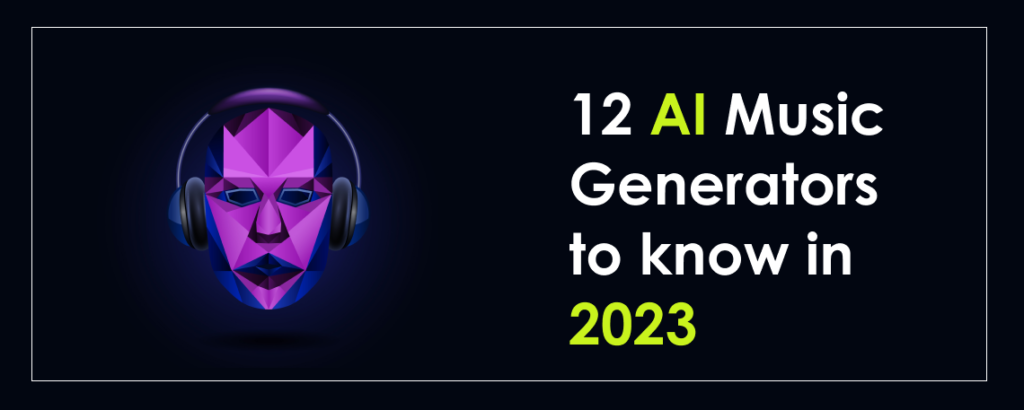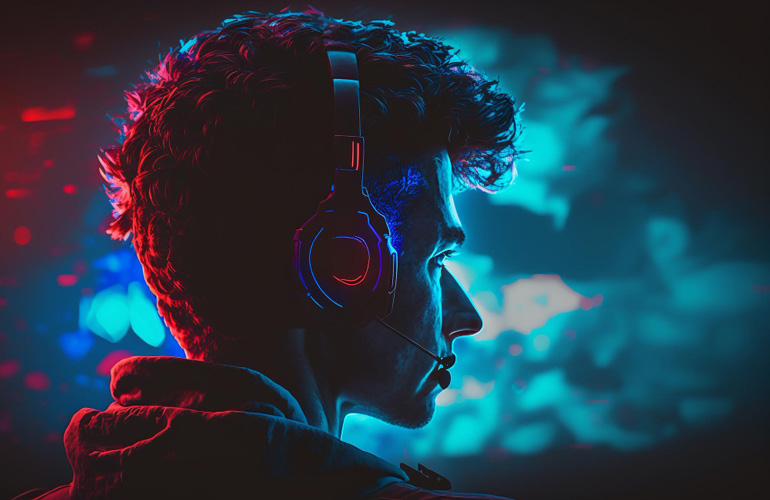
To speed up and simplify the process of making music, artists are now teaming up with artificial intelligence AI music generators to create amazing AI-generated tunes. Over the last few years, AI has really come into its own as a powerful tool for making music, helping musicians explore new sounds using advanced algorithms and software. This has led to AI-generated music becoming a mainstream sensation, adding a whole new layer to the music industry.
How Does AI Music Generators Work?
The magic behind AI-generated music happens when you feed lots of data into AI algorithms. These algorithms study chords, tracks, and all sorts of musical bits to figure out patterns for crafting music that’s similar to what the algorithms have learned. Artists are totally on board with this tech and all the possibilities it brings, which is why there’s a growing demand for AI music creators.
12 AI Music Generators and Tools
While the ultimate goal for many is to have AI create entire compositions, AI has already made a big impact on the music scene. It’s been behind things like calming ambient tunes, music that content creators can use without worrying about rights, and even tools that help make mixing and mastering way easier.
Let’s take a closer look at some of the standout players:
META’S AUDIOCRAFT
Feature: Trained on licensed music and sound effects, can turn text into audio.
Cost: It’s free
Meta’s AudioCraft takes AI-generated music to a whole new level. This tool is trained on licensed music and public sound effects. So, if you want to add some sweet sounds to a video, just give it some text prompts. AudioCraft uses a neural network called EnCodec to make sure you get awesome sounds every time and even shrinks files for easy sharing.
IZOTOPE’S AI ASSISTANTS
Feature: A bunch of AI music assistants
Cost: They’ve got products ranging from $29 to $1,999
iZotope was at the forefront of AI-assisted music production way back in 2016 with Track Assistant. This AI tool whips up custom effects settings based on a track’s unique vibe. Now they’ve got a whole suite of AI assistants that give you starting-point ideas for vocal mixes, reverb magic, and mastering tricks. They’re even the brains behind software like Spire Studio, which helped stars like Beyoncé, Kendrick Lamar, and Foo Fighters nail their mix and mastering.
OPENAI’S MUSENET
Feature: Can switch up music styles and analyze musical bits
Cost: It’s free
OpenAI’s MuseNet is like a musical wizard, composing AI-generated music that spans different styles. It knows all about rhythm, harmony, and style patterns, so you can have tracks with up to 10 instruments jamming together. This isn’t just for the pros; regular music lovers can jump in too, mixing and matching musical ingredients for some really unique tracks.
BRAIN.FM
Feature: Music for different mental states, backed by brain science
Cost: $6.99 per month or $49.99 per year
Brain.fm is like your personal mood music DJ. It uses AI to whip up tunes that help you relax, focus, and sleep better. Scientists, musicians, and techies worked together to make sure these tunes really hit the right notes. They even did a study that showed it boosts focus and productivity. So if you need some chill vibes or a focus boost, Brain.fm has your back.
LANDR
Feature: Music samples and DIY music distribution
Cost: $19.99 per month for everything
LANDR isn’t just about AI mastering; it’s a whole creative playground. Musicians can create, master, and sell their tunes. With AI analyzing different genres and styles, it takes your track and gives it that pro touch. But it doesn’t stop there. LANDR helps musicians spread their music to all the big streaming platforms, all without the hefty price tag of a traditional studio.
AIVA TECHNOLOGIES
Feature: Makes musical variations super fast, full usage rights
Cost: There’s a free plan and then other plans you can pick
AIVA Technologies is like a musical genie in a bottle. It creates soundtracks using AI, and composers can even make their own variations. No worries about licensing either; they’ve got you covered with full usage rights. Instead of replacing musicians, AIVA wants to team up with them to make even cooler music.
AMPER MUSIC’S SCORE TOOL
Feature: Web app for customizing tunes, unlimited music plan
Cost: Plans start at $19, with fancier options available
After snapping up Amper Music, Shutterstock turned their Score program into a cool web tool and an API. This lets creators tweak style, mood, and length to make the perfect track for their stuff, even if they’re not music pros. And if you’re looking to access loads of beats, Shutterstock’s unlimited music plan has got you covered.
MUZEEK
Feature: Streamlines music operations, speedy analytics
Cost: There’s a free plan and options to upgrade
Muzeek is like your music operations wingman. It’s powered by AI and takes care of all those paperwork tasks, booking schedules, ticket info, and payment stuff. Plus, it’s got a real knack for tracking web engagement and event finances. So, if you’re all about smooth music operations, Muzeek has your back.
SOUNDFUL
Feature: Royalty-free tunes, tons of moods and templates, options for licensing and monetization
Cost: They’ve got a free plan and options to level up
Soundful is your go-to AI music buddy when you need background music for videos, games, and digital ads. You’ve got a wide selection of music templates and vibes to choose from. And if you’re a bigger operation, Soundful’s got your back with options to set up licensing terms and even make some moolah off your creations.
SPLASH
Feature: All about Roblox, whips up personalized songs in no time
Cost: Totally free
Starting as “Popgun” in 2017, Splash has been all about combining AI and music in a fun and easy way. Popgun’s digital instruments were a hit, and now Splash’s AI tools are super popular in Roblox. They’re aiming to bring together user-friendly music composition and the cool world of the metaverse.
OUTPUT’S ARCADE SOFTWARE AND KIT GENERATOR
Feature: Perfect for building tracks, AI helps create collections of sounds
Cost: They’ve got a limited-time free trial, prices might change
Output’s got this awesome software called Arcade that lets you piece together loops and make full tracks. You’ve also got a bunch of cool audio presets to play with. But what’s really neat is the AI-powered Kit Generator. It uses AI to whip up full collections of sounds from different audio samples. Output’s tech has even been behind music by big names like Drake, Rihanna, and the epic scores of Black Panther and Game of Thrones.
SOUNDRAW
Feature: Royalty-free music, customizable for video sequences
Cost: They’ve got a free plan, and if you want more, there’s a $16.99 per month option
Soundraw is all about putting the power of AI in your hands. It’s got a library of royalty-free tunes that you can customize to fit your videos perfectly. You can tweak the mood, genre, song length, and even where the chorus hits. Plus, Soundraw helps sidestep some of the copyright issues that can crop up on other platforms, making it even easier to craft and share your music.
Impact of AI on Music
Alright, let’s dive into the fascinating impact of AI on music. It’s a journey that’s still unfolding, with musicians and companies all pondering how to respond to the wide reach of AI. But here’s one thing everyone agrees on: AI-generated music has completely transformed the industry, sparking both exciting possibilities and a few thorny challenges.
AI-Generated Music Leads to New and Different Forms
The rise of AI-generated music has opened up a world of fresh possibilities. Companies and individuals are now exploring new horizons by putting unique spins on well-known songs and artists.
Take, for instance, the track “Drowned in the Sun.” It’s the result of Google’s Magenta teaming up with a neural network. This AI powerhouse was fed data from numerous original Nirvana recordings, and it even crafted lyrics for a Nirvana tribute band’s singer to perform. Sure, the audio might not be crystal clear, but AI’s abilities have left even scholars amazed.
It’s able to coherently generate a multi-instrumental piece of music with metrical structure, musical phrases, progressions that make sense, all while doing it at a granular audio rate.
Shared by Oliver Bown, the author of “Beyond the Creative Species“.
As AI-generated pieces become more intricate, they’re showing off their knack for emulating musicians’ styles and sounds. But here’s the twist: artists aren’t stopping at mimicry. They’re diving deeper, using this technology to elevate their own tracks.
AI Music Generators Offers Artists More Creative Options
Musicians are embracing AI as a creative tool that collaborates with them, rather than simply imitates. It’s like having a forward-thinking partner in composition.
Imagine this: writer Robin Sloan and musician Jesse Solomon Clark joined forces to create an album using OpenAI’s Jukebox. This magical tool can continue musical snippets predictively, much like Magenta. Another example? Holly Herndon’s 2019 album, “Proto.” Vulture dubbed it the “world’s first mainstream album made with AI.” It features a neural network that churns out audio variations based on hours of vocal samples.
All this has inspired artists and technologists to dream bigger. Imagine AI models responding in real-time during performances. Instead of just trimming the interesting bits from AI-generated content, humans could spark musical ideas with AI, much like a bass player jamming with a drummer.
“It’s a long shot, but it could have a huge impact,” said Roger Dannenberg, a professor who’s into computer science, art, and music at Carnegie Mellon University.
Sure, these visions are promising, but there are uncertainties and potential downsides that artists must weigh up.
AI Music Generators Hinder Originality
While AI can nail the sonic traits of artists, it struggles to capture that spark of innovation that makes legendary musicians stand out.
“Nirvana was famous for doing things in a different way than had come before, but machine learning is really good at doing things the way that humans have already done them before,” explained Jason Palamara, assistant professor of music and arts technology at Indiana University-Purdue University Indianapolis.
The result? AI-produced tracks that sound eerily similar to existing works, leading to a lack of variety and quality in the world of AI-generated music.
Still, hope lingers for a not-so-distant future where AI transcends mimicry and jams alongside human musicians. Yet, for now, the basic versions of this tech grapple with real-time musical nuances. It turns out that the small stuff (like syncing and beat tracking) poses quite the challenge for these models, as Dannenberg pointed out.
And don’t forget about data limitations. While the “Drowned in the Sun” Nirvana track was born from rich MIDI data, live performances offer way less audio to work with. So, for live music generation, it’s a bit like having to simplify things, as Palamara shared.
AI Music Generators Spark Copyright Conflicts
Beyond a lack of originality, the legal landscape surrounding AI in music is still hazy. Those producing AI-generated music might struggle to copyright their creations. Meanwhile, musicians whose songs are analyzed by AI could find themselves unsure about when it’s appropriate to take legal action against someone copying their lyrics or other musical elements too closely.
This legal conundrum has already stirred debates in fields like AI-generated writing and art, thanks to tools like ChatGPT and Lensa. And you can bet that these arguments will echo within the music industry too. Especially when it comes to AI-generated art, questions about accuracy and authenticity will likely spill over into discussions about AI-generated music.
AI Music Generators Raise Concerns Over Job Losses
Let’s face it—concerns about job losses due to automation are a big deal in the AI realm, and music isn’t exempt. AI that crafts beats, rhythms, and melodies might take over roles traditionally held by drummers, bassists, and other musicians.
Of course, the ultimate aim is for artificial intelligence to complement musicians, serving as innovative collaborators that bring fresh sounds and techniques to the creative process. However, the possibility of AI causing job losses in the music industry is very real. It’s something artists, technologists, and everyone else involved need to carefully consider while embracing AI music generators.
Conclusion
To sum it all up, AI’s influence on the music scene is like adding a new instrument to an ever-evolving band. The way it can recreate musical styles is pretty mind-blowing, and some collaborations between AI and musicians have been pretty cool. Still, it’s a bit like trying to teach AI to catch that spark of creativity that makes your favorite songs stand out.
There’s a bit of a legal puzzle to solve too – who really owns the music that AI helps create? And let’s not forget the worry that AI might steal the spotlight from human musicians, which is a valid concern. We’ve got to make sure the music we create together is a true duet of human passion and AI’s smarts.
So, as we keep jamming into the future, let’s remember that the real magic happens when we find the sweet spot between AI’s tricks and our own musical flair. Here’s to a future where our playlists are a beautiful mix of both!
- 12 AI Music Generators to Know in 2023 - August 28, 2023





Leave A Comment